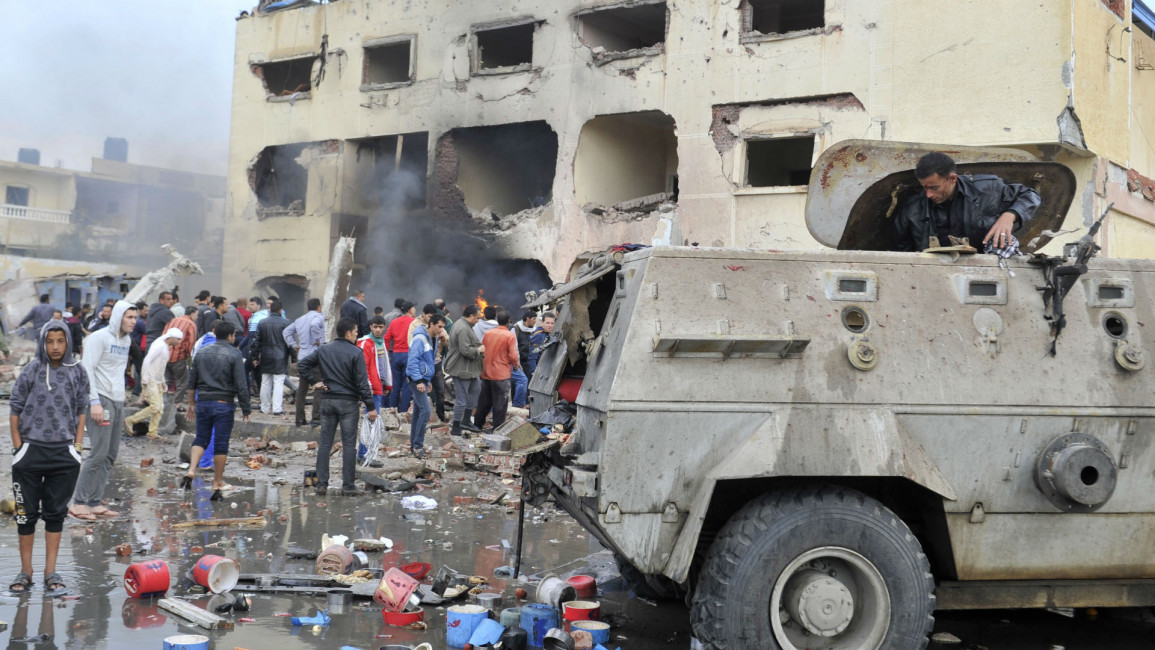Sinai militants try new tactic against army: starvation
Sinai militants try new tactic against army: starvation
Analysis: Militants in Egypt's Sinai peninsula have been experimenting with attacks on the Egyptian army's supply routes as part of their open-ended war against the state.
2 min read
Islamic State group-linked militants have targeted Egyptian security services with car bombs [AFP]
Militants linked to the Islamic State group have been systematically attacking the Egyptian army's supply routes on the Sinai peninsula, aiming to cut off deliveries of food and water.
The Wilayat Sinai militia, formerly known as Ansar Beit al-Maqdis, has killed hundreds of Egypt's security forces since an uptick in violence following the army's ousting of Islamist former President Mohammad Morsi in the summer of 2013.
Egyptian forces have responded with mass arrests, thousands of house demolitions and have used helicopters and fighter jets against suspected militant holdouts.
Recent attacks have shown a change of tactics on the part of the militant group, which has proved itself to be strategically flexible and able to inflict heavy casualties with surprise attacks on army bases and convoys.
On April 12, fighters set alight a fuel tanker headed for army checkpoints near the village of Sadout, west of Rafah.
Wilayat Sinai also destroyed two municipal tankers belonging to the city of Sheikh Zuweid, which were carrying supplies bound for the army.
The group, whose name translates to "Sinai Province" in English, has positioned itself as the would-be local governorate of the self-declared "Islamic State". It changed its name last year - from Ansar Bayt al-Maqdis ["Supporters of the Holy House"] - when it pledged allegiance to self-styled "Caliph" Abu Bakr al-Baghdadi.
It has called on locals to fight government forces, threatening to kill anyone "collaborating" with the police or the army - including by providing water, food, fuel, building materials or labour.
These tactics, along with surprise suicide car bombings and roadside bomb attacks on army convoys, have proved enormously challenging for the government - which has seen the fight in Sinai as a key test of its ability to deliver stability and security in post-revolutionary Egypt.
Yusri Qandil, a military expert, said the army must take measures to counter the group, and to tighten its control over vital roads.
He recommended shoring up the Joint Forces and making better use of intelligence from locals and tribes - the majority of which, he said, support armed operations against the group.
Qandil said Wilayat Sinai's attacks show a degree of sophistication and advanced capabilities, indicating that the group may well be receiving support from abroad.
This is an edited translation from our Arabic edition.
The Wilayat Sinai militia, formerly known as Ansar Beit al-Maqdis, has killed hundreds of Egypt's security forces since an uptick in violence following the army's ousting of Islamist former President Mohammad Morsi in the summer of 2013.
Egyptian forces have responded with mass arrests, thousands of house demolitions and have used helicopters and fighter jets against suspected militant holdouts.
Recent attacks have shown a change of tactics on the part of the militant group, which has proved itself to be strategically flexible and able to inflict heavy casualties with surprise attacks on army bases and convoys.
On April 12, fighters set alight a fuel tanker headed for army checkpoints near the village of Sadout, west of Rafah.
Wilayat Sinai also destroyed two municipal tankers belonging to the city of Sheikh Zuweid, which were carrying supplies bound for the army.
The group, whose name translates to "Sinai Province" in English, has positioned itself as the would-be local governorate of the self-declared "Islamic State". It changed its name last year - from Ansar Bayt al-Maqdis ["Supporters of the Holy House"] - when it pledged allegiance to self-styled "Caliph" Abu Bakr al-Baghdadi.
It has called on locals to fight government forces, threatening to kill anyone "collaborating" with the police or the army - including by providing water, food, fuel, building materials or labour.
These tactics, along with surprise suicide car bombings and roadside bomb attacks on army convoys, have proved enormously challenging for the government - which has seen the fight in Sinai as a key test of its ability to deliver stability and security in post-revolutionary Egypt.
Yusri Qandil, a military expert, said the army must take measures to counter the group, and to tighten its control over vital roads.
He recommended shoring up the Joint Forces and making better use of intelligence from locals and tribes - the majority of which, he said, support armed operations against the group.
Qandil said Wilayat Sinai's attacks show a degree of sophistication and advanced capabilities, indicating that the group may well be receiving support from abroad.
This is an edited translation from our Arabic edition.

![A Palestinian girl stands amid the rubble of her destroyed home on 24 May 2021 in Beit Hanoun, Gaza. [Getty]](/sites/default/files/styles/image_212x120/public/2021-06/GettyImages-1233090336.jpg?h=a4507e6b&itok=XJNlCZFA)

